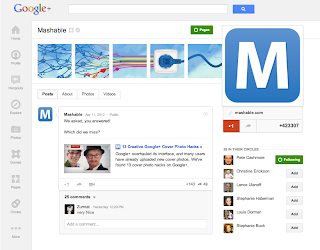How Mashable is growing with Google+
April 19th, 2012 | Published in Google Adsense
Mashable is an independent news site devoted to digital culture and technology and was one of the first publishers to join Google+. Since joining, Mashable has been building their audience on the platform, growing Google+ into one of their top 10 sources of referral traffic. We chatted with Mashable’s Community Manager, Meghan Peters, about their first few months on Google+ and what’s made them so successful.
Mashable has used their Google+ page to expand their audience and deliver content in new ways. As Meghan says, “A lot of news organizations I think fall under the trap of just seeing social networks as broadcast platforms for their content... With Google+, I think that we have a lot of opportunity to take advantage of the cool features that the platform has, and really do more engaging projects rather than just posting our stories.”
For example, Mashable has been using Hangouts, a live multi-person video chat tool, to meet their audience face to face, creating deeper interactions. “I haven’t seen anything else like Hangouts in terms of crossing that barrier of really making a connection,” Meghan says. “I feel like it’s the deepest connection you could get.”
Hangouts has also connected Mashable employees with each other. With their headquarters in New York City and editors scattered across the U.S. and Europe, Mashable now uses Hangouts as a virtual meeting tool. The screenshare feature even helps Meghan train remote staffers who can follow along with her presentations.
 Mashable has learned by doing, and that all started by creating a Google+ page. “We tried a lot of things early on, and were able to catch on quickly to what was working and what wasn’t, and have been able to shift our strategy pretty well from there,” Meghan says. Some of what she’s learned is below:
Mashable has learned by doing, and that all started by creating a Google+ page. “We tried a lot of things early on, and were able to catch on quickly to what was working and what wasn’t, and have been able to shift our strategy pretty well from there,” Meghan says. Some of what she’s learned is below:
Follow Mashable on Google+ and download the full case study here.
Posted by Rico Farmer, Product Marketing Manager
Mashable has used their Google+ page to expand their audience and deliver content in new ways. As Meghan says, “A lot of news organizations I think fall under the trap of just seeing social networks as broadcast platforms for their content... With Google+, I think that we have a lot of opportunity to take advantage of the cool features that the platform has, and really do more engaging projects rather than just posting our stories.”
For example, Mashable has been using Hangouts, a live multi-person video chat tool, to meet their audience face to face, creating deeper interactions. “I haven’t seen anything else like Hangouts in terms of crossing that barrier of really making a connection,” Meghan says. “I feel like it’s the deepest connection you could get.”
Hangouts has also connected Mashable employees with each other. With their headquarters in New York City and editors scattered across the U.S. and Europe, Mashable now uses Hangouts as a virtual meeting tool. The screenshare feature even helps Meghan train remote staffers who can follow along with her presentations.

- Be active Meghan credits Mashable’s success in part to its strong and persistent presence on Google+. “We’re pretty hands-on. We have someone in there posting and moderating every day... which I think has been really important for us to maintain a presence there.”
- Add Google+ plugins When Mashable added the Google+ badge to their homepage, they increased their Google+ page audience by 38 percent. Mashable also uses the +1 button on articles and across the site to empower sharing to Google+.
- Co-create Another key to keeping Mashable’s fans engaged is its innovative approach to audience interaction and brand co-creation. A contest run via Mashable’s site to design their Google+ page sparked a wave of enthusiasm. As Meghan recalls, “We got really good feedback once we posted [the winning design]. A lot of people thought it was really cool – not only that the design was good-looking – but also that we did a contest like that and let people have the opportunity to participate.”
Follow Mashable on Google+ and download the full case study here.
Posted by Rico Farmer, Product Marketing Manager